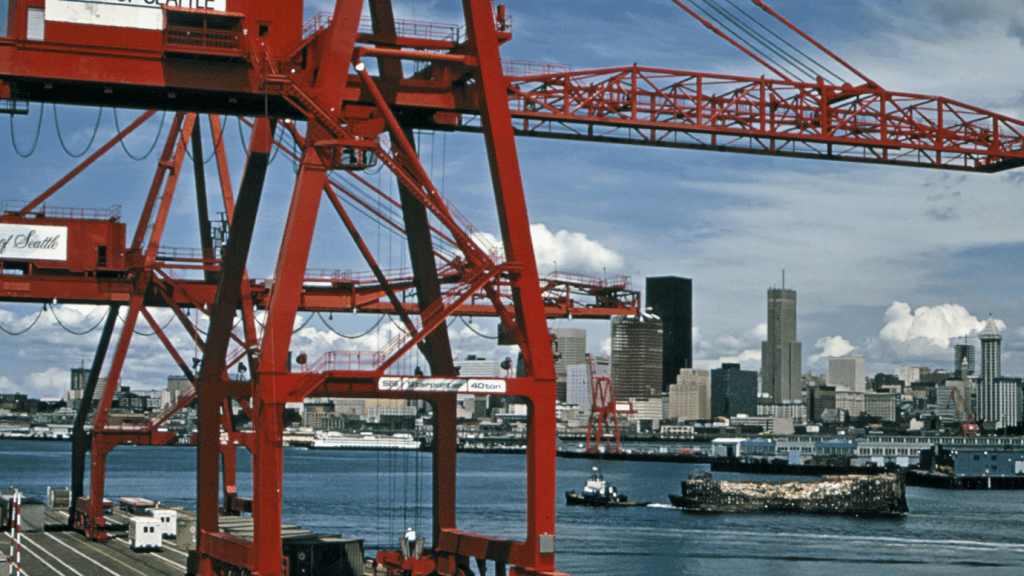
Canada Appeals for International Firefighting Aid
June 09, 2025: Canada has issued an international appeal for firefighting support as wildfires intensify across multiple provinces

June 15, 2023: The labor strife continues on the west coast with the announcement of the Port of Seattle shutting down because of the International Longshore and Warehouse Union (ILWU) refusing to dispatch labor to work at the container terminals. This is according to a report by the Pacific Maritime Association (PMA), which means the terminals at the ports.
The West Coast ports have faced continuous worker slowdowns and stoppages all week, where an estimated $5.2 billion of trade is floating off the Ports of Los Angeles, Long Beach, and Oakland.
In an email statement, the ILWU said the union remained to bargain a “fair and equitable contract describing the hard work and contributions of its members toward the ongoing success of the multibillion-dollar shipping industry.”
The ILWU also accused the PMA of using the media to leverage one-sided information to influence the process.
“Despite what you are hearing from PMA, West Coast ports are open as we continue to work under our expired collective bargaining agreement,” stated International President Willie Adams.
The Port of Seattle and its twin port, The Port of Tacoma, comprise the Northwest Seaport Alliance (NWSA). The Port of Seattle is one of the top maritime ports in North America that U.S. ag exporters rely on to ship their produce and grain. Some 40% of the State of Washington’s jobs are tied to trade.
Top trading partners were China, Japan, Vietnam, South Korea, Taiwan, Thailand, Indonesia, Malaysia, Philippines, and India in 2022.
Agriculture Transportation Coalition (AgTC), which represents ag shippers, stated that these disruptions are exporters hurting the reputation of U.S. ag exporters as a reliable trading partner.
“When the ILWU-PMA negotiations broke down at the end of a previous contract, Japan’s Agriculture Ministry wrote our U.S. Dept of Agriculture, to the effect, ‘Your ports aren’t working, but our cows are still eating.’ The impact of these West Coast disruptions is experienced worldwide,” stressed Peter Friedmann, executive director of AgTC.
The top six U.S. exports, the port’s website stated, include apples ($2.185 billion), milk ($1.209 billion), cattle ($801.5 million), wheat ($756.8 million), potatoes ($712.4 million), and hay ($601.7 million). The total value of the exports in 2022 was $5.66 billion.
The NWSA is the second-largest gateway of the country for refrigerated containers called “reefers.” Frozen products like french fries, meat, dairy, apple, and fish are shifted in these specialized containers.
We provide the insights on leaders who are responsible for taking their organization to new heights, all the while bringing together a group of talented individuals.

June 09, 2025: Canada has issued an international appeal for firefighting support as wildfires intensify across multiple provinces

May 27, 2025: Air Canada Cuts Five U.S. Routes for Winter 2025–26, Part of Broader Cross-Border Retrenchment

May 26, 2025: Trump Freezes $2.2B in Federal Grants to Harvard Over DEI, Threatens Tax-Exempt Status.

May 14, 2025: Microsoft has announced plans to reduce its global workforce by approximately 3%, affecting roughly 10,000 employees across multiple departments.

May 13, 2025: The Trump administration is considering suspending the constitutional right of habeas corpus in a bid to accelerate mass deportations.

April 29, 2025: Donald Trump’s second term has reached the 100-day mark under sustained public skepticism, with national approval ratings